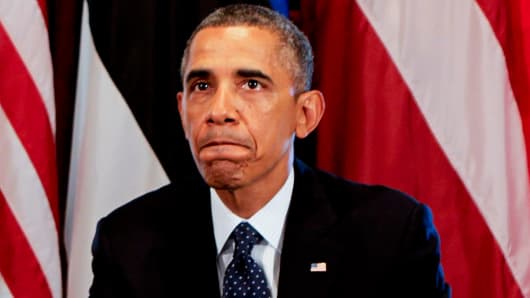The US, together with as many countries as will cooperate, could use force to eliminate Syria's fixed-wing aircraft as a first step toward enforcing Resolution 2139. "Aerial bombardment" would still likely continue via helicopter, but such a strike would announce immediately that the game has changed. After the strike, the US, France, and Britain should ask for the Security Council's approval of the action taken, as they did after NATO's intervention in Kosovo in 1999.
Equally important, shots fired by the US in Syria will echo loudly in Russia. The great irony is that Putin is now seeking to do in Ukraine exactly what Assad has done so successfully: portray a legitimate political opposition as a gang of thugs and terrorists, while relying on provocations and lies to turn non-violent protest into violent attacks that then justify an armed response.
Read MoreRussia to Western business: Everything's just fine
Recall that the Syrian opposition marched peacefully under fire for six months before the first units of the Free Syrian Army tentatively began to form. In Ukraine, Putin would be happy to turn a peaceful opposition's ouster of a corrupt government into a civil war.
Putin may believe, as Western powers have repeatedly told their own citizens, that NATO forces will never risk the possibility of nuclear war by deploying in Ukraine. Perhaps not. But the Russian forces destabilizing eastern Ukraine wear no insignia. Mystery soldiers can fight on both sides.
Putting force on the table in resolving the Ukraine crisis, even force used in Syria, is particularly important because economic pressure on Russia, as critical as it is in the Western portfolio of responses, can create a perverse incentive for Putin. As the Russian ruble falls and foreign investment dries up, the Russian population will become restive, giving him even more reason to distract them with patriotic spectacles welcoming still more "Russians" back to the motherland.
Obama took office with the aim of ending wars, not starting them. But if the US meets bullets with words, tyrants will draw their own conclusions. So will allies; Japan, for example, is now wondering how the US will respond should China manufacture a crisis over the disputed Senkaku Islands.
To lead effectively, in both the national and the global interest, the US must demonstrate its readiness to shoulder the full responsibilities of power. Striking Syria might not end the civil war there, but it could prevent the eruption of a new one in Ukraine.
Commentary by Anne-Marie Slaughter, president and CEO of the New America Foundation. She is also the author of "The Idea That Is America: Keeping Faith with Our Values in a Dangerous World." Follow her on Twitter @SlaughterAM.
Copyright: Project Syndicate, 2014.


